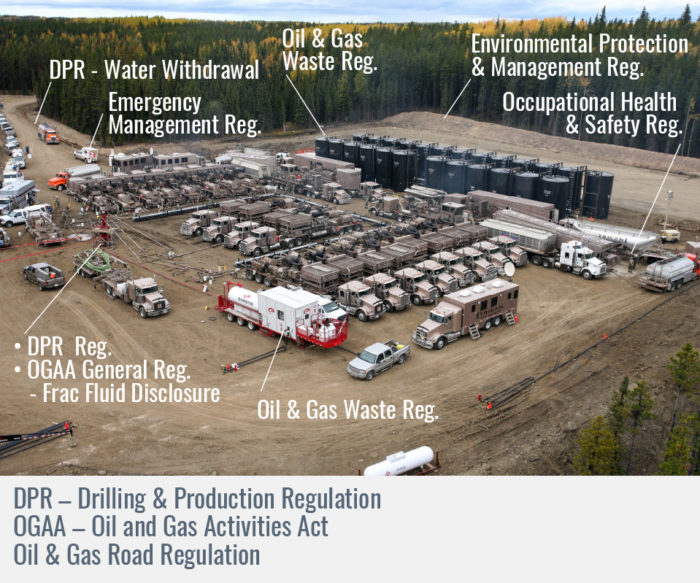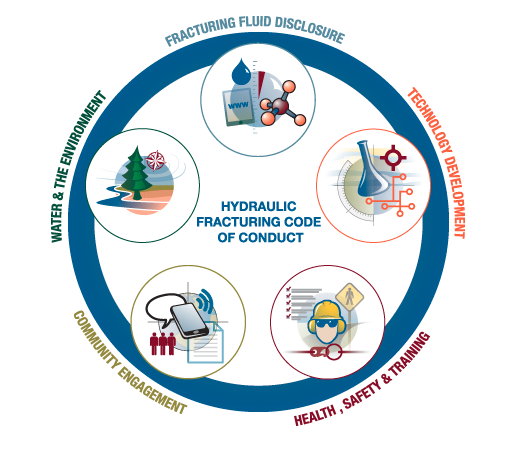Oil and gas operations, including hydraulic fracturing or fracking, are strictly regulated in Canada. Oil and gas exploration, development and production activities are governed by legislation, regulations and/or guidelines.
As fracking has evolved, so too have the regulations that protect Canadian ecosystems and communities. Enhancements to existing regulations will continue to ensure the responsible development of Canada’s oil and gas resources.
Source: Alberta Energy Regulator (AER)

Source: Developed with information from British Columbia Oil and Gas Commission. Photo credit: Trican
Who Regulates Canada’s Oil and Natural Gas Sector?
Depending on the nature of the activity and where it occurs, federal, provincial/territorial and local governments are all part of the robust regulatory framework.
Federal
The Federal government regulates oil and gas activities on some frontier lands (Nunavut and limited parts of Northwest Territories), certain offshore areas, and lands set aside for Indigenous people. For example:
- Indian Oil and Gas Canada manages and regulates oil and gas resources on First Nation reserve lands
- National Energy Board regulates international and interprovincial aspects of the oil, gas and electric utility industries, such as pipelines, energy development and trade, in the Canadian public interest
- Natural Resources Canada provides geoscience information used in making exploration, resource management and environmental protection decisions
Provincial/Territorial
Provinces have jurisdiction over their onshore resources and are responsible for regulating their development. The regulators for each province or territory are as follows:
- Alberta Energy Regulator
- British Columbia Oil and Gas Commission
- New Brunswick Natural Gas
- Newfoundland and Labrador Department of Natural Resources
- Northwest Territories Office of the Regulator of Oil and Gas Operations (OROGO)
- Nova Scotia Department of Energy
- Ontario Ministry of Natural Resources
- Petroleum Branch of Manitoba Innovation, Energy and Mines
- Prince Edward Island Department of Finance, Energy and Municipal Affairs
- Québec Natural Resources
- Saskatchewan Energy and Resources
- Yukon Department of Energy, Mines and Resources
There are also many other provincial and territorial regulating bodies with legislation applying to the oil and gas industry, such as those dealing with environment, labour, safety and transportation.
Regulations Specific to Fracking
British Columbia and Alberta have a long history of production using fracking technology and they are leaders in frac-related regulations and practices. The focus of the regulations is as follows:
- Well Casing and Cementing – casing design and cementing requirements isolate and protect usable groundwater and surface casing must be cemented to surface
- Protecting Water Wells and Groundwater –fracking restrictions exist in proximity to water wells; only non-toxic fracturing fluids can be used above usable groundwater levels; and baseline water well testing is required prior to hydraulic fracturing
- Chemical Disclosure – mandatory public disclosure of fracture fluid composition in British Columbia and Alberta through FracFocus.ca
- Water Use Water licences/permits are required for fresh water withdrawals as well as the requirement for withdrawal limits and reporting
- Fluid Handling and Waste Management – there are requirements for proper containment of used or generated fluids and fluids that cannot be recycled or reused must be injected into regulated deep disposal wells
- Anomalous Induced Seismicity – seismic monitoring, reporting and mitigation
- Inter-wellbore Communication – coordination and risk assessment required among operators
Frac Fluid Disclosure
FracFocus is a chemical disclosure registry that provides objective information on fracking in Canada. Its main focus is to provide transparency on the ingredients that make up frac fluids. British Columbia, Alberta, Northwest Territories, Nova Scotia and the National Energy Board are all members of FracFocus.ca.
Compliance and Enforcement
Compliance and enforcement across Canadian oil and gas jurisdictions help ensure the rules are followed at every stage of development, including fracking. Compliance and enforcement programs are designed to safeguard public safety and environmental integrity, and they are built on a foundation of education, prevention, and enforcement. In addition, regulators work hard to communicate with oil and gas operators and service companies on lessons learned, advances in science and technology and making sure the rules and regulations are understood and followed.
Examples of compliance and enforcement programs:
- British Columbia Oil and Gas Commission Compliance and Enforcement
- Alberta Energy Regulator Compliance Dashboard
Industry Practices and Initiatives
Industry regulates its operations over and above government regulation. Canada’s oil and gas industry has developed guidelines, operating best practices, and Industry Recommended Practices (IRPs). These are prepared by experienced industry and government personnel and are used in conjunction with all applicable government regulations.
A number of guiding principles and operating practices are in place to ensure responsible fracking operations:
- Canadian Association of Petroleum Producers’ (CAPP) hydraulic fracturing operating practices
- #1 Fracturing Fluid Additive Disclosure
- #2 Fracturing Fluid Additive Risk Assessment and Management
- #3 Baseline Groundwater Testing
- #4 Wellbore Construction and Quality Assurance
- #5 Water Sourcing, Measurement and Reuse
- #6 Fluid Transport, Handling, Storage and Disposal
- #7 Anomalous Induced Seismicity: Assessment, Monitoring, Mitigation and Response
- Petroleum Services Association of Canada (PSAC) Hydraulic Fracturing Code of Conduct that covers frac fluid disclosure, technology development, health, safety and training, community engagement and water and the environment
- Enform’s Industry Recommended Practices (IRPs) are a series of recommended operational practices in the areas of drilling, fracking and servicing of oil and gas wells

